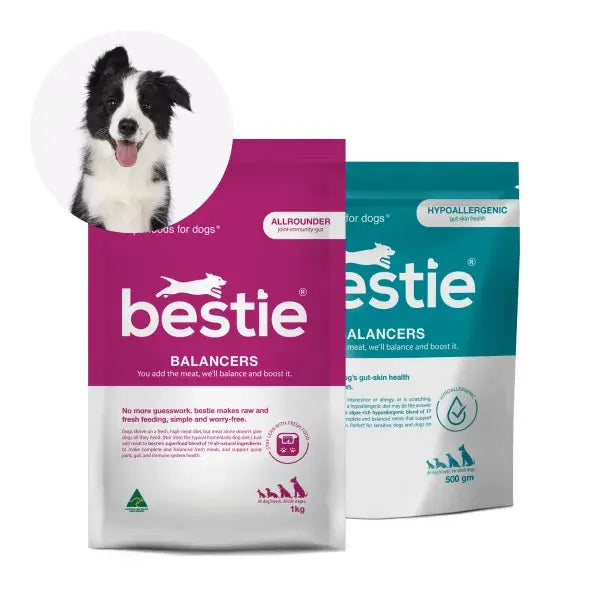As dogs age, their brains do too.
Standing in a daze, pacing at night, walking into walls, are common signs of age-related cognitive decline. At Bestie Kitchen, we and our consulting integrative vet have created an antioxidant-rich health jelly/gummy chew that's designed to help reduce disturbed behaviour and improve quality of life, as dog age.
Called The Einstein, this daily health booster is based on two key research studies.
In a nutshell, this is what they show:
As dogs age, their brains age too, especially in learning and memory
Their decline mimics human cognitive decline
In addition, age-related deteriorations are unlikely to improve without treatment
A specific antioxidant-rich supplement was effective in delaying the decline
The addition of gingko was also effective
The combination of enrichment activities and the supplement was more effective that either one on their own
The studies in more detail: study 1
The first research study involved 48 old and 17 young beagle dogs, and ran over a two-year period.
Earlier research had already established that dogs show marked age-dependent decline in learning and memory, and that the pattern of cognitive decline mirrors that seen in humans in several respects. Aged dogs also develop neuropathology that is similar to that seen in both successfully ageing humans and patients with Alzheimer’s disease.

In this study, researchers wanted to obtain longitudinal data of age-dependent decline in learning ability. They also wanted to assess the effectiveness of two interventions in counter acting age-dependent decline: behavioural enrichment and a maintenance food fortified with a broad spectrum of antioxidants and mitochondrial cofactors.

What they found
The study showed that both discrimination and reversal learning ability decline progressively with advanced age in beagle dogs, but that the rate of decline can be delayed by both behavioural enrichment and antioxidant supplementation. Possibly the most important outcome of this study was the demonstration that the behavioural enrichment and the antioxidant supplementation condition combined were more effective than either alone.
Dietary fortification had significant beneficial effects after a short time frame among animals provided with behavioural enrichment, but the fortified food on its own, remains an effective therapeutic after two years of treatment. It’s worth noting that The Einstein also includes ginkgo, the use of which is based on another research study.
Study 2
The second research study was an open clinical trial conducted in 10 veterinary practices, where ginkgo leaf extract was administered as a dietary supplement to 42 elderly dogs (mean age 11.4 years) for 8 weeks. Geriatric behavioural changes were classified by the following assessment scores: orientation in home and yard, social interactions, housetraining, and sleep-wake cycles.

What they found
In dogs with a history of geriatric behavioural disturbances a positive effect was apparent after four weeks and significantly reduced after eight weeks of treatment. 36% of the dogs were completely free of clinical signs by the end of the study, and for 79% of dogs, overall efficacy was judged as good or very good. It’s worth noting that improvement in slow age-related deteriorations are unlikely to occur without effective treatment.
Researchers had hypothesised that ginkgo would be effective for elderly dogs because of the extract has proven effective in human medicine for the symptomatic treatment of cerebral insufficiency, peripheral arterial occlusive disease and disturbances of vestibular origin.

One primary indication is the symptomatic treatment of a mild to moderate cognitive performance disorder that relates to impaired peripheral and cerebral blood circulation, in an elderly population. This geriatric condition is characterized by impairments of, among others, attention, working memory, short term memory, complex reaction times and related social behaviour.
Researchers concluded that “Ginkgo appears to be an efficacious agent that provides a safe dietary supplementation for the elderly dog with age related behavioural disturbances…and could tremendously increase the quality of life of the elderly dog.”
Studies:
Milgram, N.W. & Head, Elizabeth & Zicker, S.C. & Ikeda-Douglas, H Murphey, B Muggenburg, B & Siwak, C & Tapp, Philip & Cotman, C.W.. (2005). Learning ability in aged beagle dogs is preserved by behavioral enrichment and dietary fortification: A two-year longitudinal study. Neurobiology of aging. 26. 77-90. 10.1016/j.neurobiolaging.2004.02.014.
Reichling, J & Frater-Schröder, M & Herzog, K & Bucher, Stephan & Saller, Reinhard. (2006). Reduction of behavioural disturbances in elderly dogs supplemented with a standardised Ginkgo leaf extract. Schweizer Archiv für Tierheilkunde. 148. 257-63. 10.1024/0036-7281.148.5.257.















